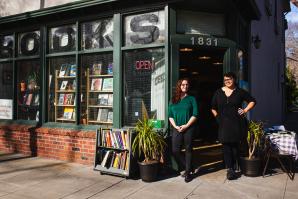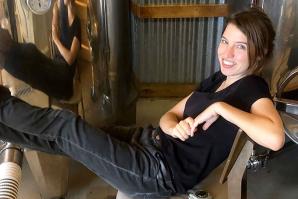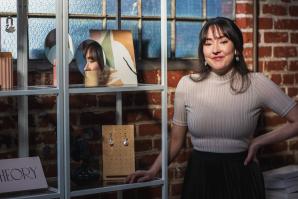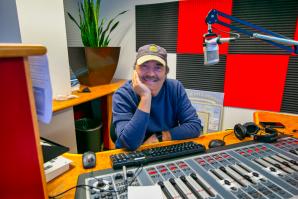Every day since March, Vicki Gonzalez has biked to what she considers “the best gig in Sacramento.” As the new host of “Insight,” CapRadio’s one-hour morning radio program covering the Sacramento region’s issues and events, she brings 15 years of news reporting experience and a multicultural point of view. During a recent conversation in the garden area of the CapRadio office on the Sacramento State campus, surrounded by spring flowers, she said that she is happiest when she is outside.
Most recently, Gonzalez reported breaking news and in-depth features for KCRA. For five years, she covered fluid, quickly developing stories such as California’s destructive wildfires and various health crises, and occasionally filled in as an anchor. Not one to skirt the surface of an issue, she also dove deeper with half-hour specials and, in 2020, produced “Return to Paradise,” an hour-long documentary on survivors of the Camp Fire in Paradise, the deadliest fire in California history.
“(I followed survivors) for the better part of a year about how they picked up the pieces and regained their sense of community and normalcy after enduring something so tragic,” Gonzalez says. She received a 2020 Regional Murrow Award for the documentary, as well as multiple Emmy Awards for her reportage on issues like the health disparities of homelessness.
A graduate of UC Berkeley, Gonzalez went on to report and anchor for news programs in Los Angeles, the Texas-Mexico border and Las Vegas before landing on the Sacramento scene in 2016. She thrives on exploring the nuances and layers of storytelling, enjoys making her subjects comfortable and likens her responsibilities as a journalist to that of a historian. “We’re there to document what’s happening,” she says, “because it’s going to be looked at in history books decades from now.”
Gonzalez takes the torch from Beth Ruyak, who hosted “Insight” for eight years. Ruyak, known for her warm, authentic interview style, announced her impending departure last year with plans to explore new projects. “Beth was incredibly gracious,” Gonzalez says. “I’ve listened to her every day and admire her as a journalist. … When it was announced that I got the position, she sent me just a beautiful gift basket … with the Terry Gross book called “All I Did Was Ask.”
As for Gonzalez’s approach, she is excited by the prospect of long-form interviews afforded by the audio medium, comparing it to TV journalism’s “snapshot” style. “What I love about ‘Insight’s’ format is that it’s deconstructed,” she says. “It’s two people having a conversation and going deep into a topic, not only explaining what’s happening, but why it’s happening.”
On how my cultural background and experiences shape my point of view: I’m the product of two interracial marriages. I’m Mexican, Japanese and English. My mother is Japanese and English. My dad is Mexican — born in Guadalajara — as well as my abuelos. And I’m really grateful for that because you have a variety of perspectives and life circumstances that led to me existing. (Laughs).
That has really shaped my views and has a lot to do with why I’m a journalist — I love learning about other people and I love being reminded about how much I don’t know. That’s really a motivating factor for me and the momentum that drives me as a journalist, especially when you’re going from a big city, like Los Angeles and then McAllen, Texas, the Texas-Mexico border, to then Las Vegas and now Sacramento and Northern California. You’re constantly learning, and that is something that drives me every day.
On my storytelling focus and style: My focus has deepened (as I’ve covered different cities). I’m really interested in human interest stories, and that’s pretty much anything, right? (My focus) could be a piece of legislation. It could be demonstrations or rallies. It could be something as tragic as a mass shooting or wildfires. I think my focus deepens in the fact that I really like to go beyond the surface level and I like to sift through the layers and the nuances of an issue. I do the work to make it easier for viewers or listeners to have a better understanding.
Journalism as a bridge to connection: I think more than ever, especially during the pandemic, when we’ve all been physically disconnected, journalism and storytelling allows you to connect with others. It allows you to connect with your neighbor. It allows you to connect with a stranger. It allows you to be introduced to an idea or person or way of life that you didn’t know existed before.
What I love about storytelling in journalism is we become aware of our blind spots in a constructive way. And we’re all better for being aware of our blind spots and broadening our perspective of what’s going on, whether it’s our backyard to what’s going on in the world.
On making people feel comfortable sharing their stories: I look at interviewing someone as if I’m welcoming someone into my home. So I want to make someone feel really comfortable. And I think one of the attributes I have that I enjoy is being humble and having humility. We share more in similarities than we share in differences, and I love making people feel at ease.
So I would explain to someone doing an interview that it’s really just a conversation and what you have to say is important. And that’s why we want to share what you have to say with others. I think once they realize that it really is just a conversation and they’re just talking about what they know or what they’ve been through, it becomes an easier experience.
Distinctive storytelling styles for both audio and visual: The difference between being a TV journalist and “Insight,” which is largely a live interview show, is that (the television format) is more excerpts of an interview. And then you might marry that with natural sound and there’s more production value to it as opposed to “Insight.”
What I’m listening to: I have a few favorite podcasts. I listen to “The Daily” every morning as I’m getting ready for work. Also “Up First” on NPR. I also like listening to “Sway” as a podcast with New York Times where (Kara Swisher) talks to the most powerful people in the world that make decisions that shape our lives. I find that really interesting. I’ve always loved “Fresh Air” with Terry Gross, “This American Life” and “Radiolab.”
If I’m not listening to a podcast, I’m probably on Spotify and I’m listening to music, and I love just finding new bands. I used to listen to “Morning Become Eclectic” (a music program), and that’s KCRW in Los Angeles.
Being an activist of journalism, and a quasi-historian: I think it’s important to cover activism, especially after the past year. We need to listen to our community, especially for gathering in large numbers. They’re frustrated and they want change. Being a journalist is also in some respects being a historian. We’re there to document what’s happening because it’s going to be looked at in history books decades from now. And that is never lost on me when I’m covering demonstrations or protests or the variety of activism that takes place.
As far as activism on my part, I’m an activist of journalism. I think journalism has taken a big hit in the past couple of years. I passionately believe in what I do for a living and finding objective, fair and balanced information. I think more so now, we fight for that because it’s incredibly important.
My love for Sacramento: I can’t say enough how much I love Sacramento. This is going to be my home forever for my husband and I. I love that Sacramento is a city, but has a small-town feel. I love that you’re connected to your neighbors in a way through local restaurants. And you’re connected to your food that you eat because, you know, we have the blessing of having farmers and ranchers in our backyard. I love being outside and that I can walk around my neighborhood surrounded by tons of trees, bike the American River Bike Trail, or bike along the Sacramento River. You go a half hour in any direction and you can find new hiking trails, lakes, rivers. It’s really endless. You’re in the center of everything.
My favorite spots for coffee, the fuel of every journalist: What I love about Sacramento is that there’s a lot of locally owned coffee roasters and coffee shops. I like to pollinate the local coffee scene, but I would say the beans I buy the most and I brew at home would be Pachamama, as well as Milka (Coffee Roasters) in Midtown.
The Mill, too, which is on campus at Sacramento State. I go there probably more than all the other spots because I’m on my way to work and I just pop in. I love their cold brew and they make housemade syrups. I mix that with a little bit of oat milk.
–
Stay up to date on business in the Capital Region: Subscribe to the Comstock’s newsletter today.
Recommended For You

Getting to Know: Miranda Culp and Laurelin Gilmore
The owners of Amatoria Fine Art Books in Sacramento share a deep love of books
Miranda Culp and Laurelin Gilmore are accustomed to the look of
wonder on the faces of the people who stumble into their
independent bookshop, Amatoria Fine Art Books.

Getting to Know: Julianna Boggs
Tabeaux Cellars co-owner on building a family-run winery in Amador County
The family behind Tabeaux Cellars is not of your standard wine-country lineage. Rather, they are “just a family producing a decidedly small allocation of foothill glou glou,” as the winery’s charming Instagram bio states.

Getting to Know: Elyse Tolles
Sacramento designer of polymer clay-based jewelry has gained national recognition in her craft
Elyse Tolles is a one-woman show — a designer of artful jewelry
and a former flutist.

Still Fabulous After 50
Local radio DJ legend Joey Mitchell celebrates a half-century in ‘cutthroat’ business
Sacramento’s K-Hits 101.5 recently celebrated Mitchell’s 50-year milestone in radio with a four-day studio party that honored his long and colorful career.



